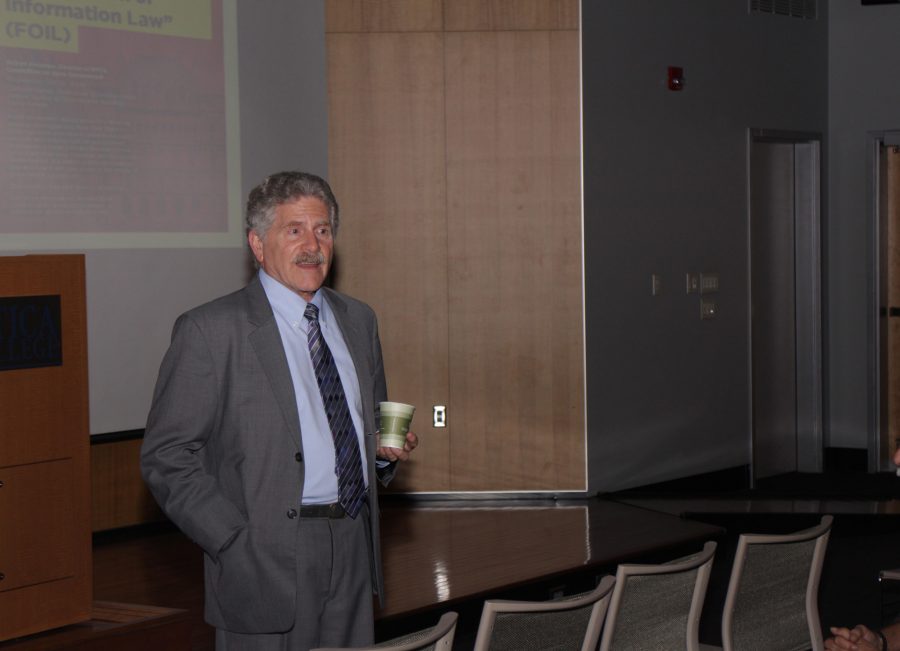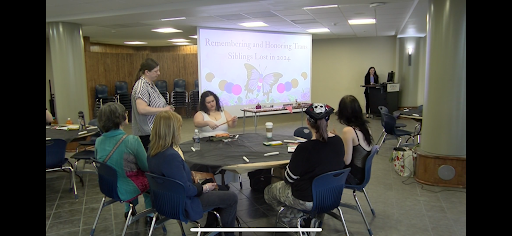Amanda Paladino, Assistant News Editor
Last Wednesday, Oct 18, Executive Director for the Committee on Open Government Robert J. Freeman held a presentation in the Carbone Auditorium discussing the Freedom of Information Law (FOIL).
The event, hosted by Professor Brett Orzechowski, welcomed Utica College students and members of the community to gain from Freeman’s insight and build a better understanding of FOIL.
Freeman has held his position within the Committee on Open Government for over 40 years and has worked with seven governors from both parties, trailblazing territory others typically shy away from and fighting for citizens’ freedom to know. Although he acknowledged that there are instances in which information is rightfully withheld, including situations where privacy is at risk, disclosure being harmful is essentially the only limitation regarding FOIL.
“Everything is open except to the extent that disclosure would hurt,” Freeman said.
Seen by many as an open-government idealist, Freeman’s career allows him to act as a tool for anyone looking for advice on how to seek information in which they otherwise may have been denied. His work hours often consist of phone calls during which he advises local governments, advocates, state agencies, media journalists and everyday citizens on the complex details of FOIL, and how to use it to their advantage. This often means developing a persistent approach, making it clear to government agencies that the rights of the citizen to certain information will not be ignored.
“If I’m not upsetting someone every day, I’m not doing my job,” Freeman said.
He also acknowledged that thanks to the Internet, obtaining government records has never been easier. Organizations are now able to post information for public access at will, and awareness of FOIL, which has been in existence for decades, is at a heightened increase.
Freeman highlighted the law’s applicability on even the simplest of levels – like a frustrated high school student who wants to know if their teacher is actually certified in teaching math. He also emphasized the direct accountability that FOIL implements, especially when used on the local level.
“Government touches us all from birth to death and everything in between,” Freeman said. “It touches us all directly, and with smaller units of government, the law works better. There’s a degree of accountability that doesn’t ordinarily exist as we go to the state or federal level.”
Freeman also discussed how FOIL can be useful to college students on the verge of adulthood as they strive to become increasingly aware of the world around them. When examining upcoming elections, especially local ones, FOIL can be a valuable aid in learning more about a candidate’s stance on key issues.
But FOIL’s applicability runs much deeper than that, stretching into further issues such as medical and education records – yes, including records that are our own. At a time where the government is collecting more information than ever before on citizens, it’s crucial to develop a level of familiarity of what rights exist for individual access.
“People forget or do not realize how much they’re privy to,” Orzechowski said. “In terms of privacy, these are your records kept by government that you might not know they’re keeping.”
Just as Freeman noted government’s direct impact on all of our lives, Orzechowski brought the notion full circle in acknowledging how the Freedom of Information Law does the same.
“FOIL really does impact everybody in the state in some capacity,” Orzechowski said.


















![President Todd Pfannestiel poses with Jeremy Thurston chairperson Board of Trustees [left] and former chairperson Robert Brvenik [right] after accepting the university's institutional charter.](https://uticatangerine.com/wp-content/uploads/2023/10/unnamed.jpeg)




















































































































